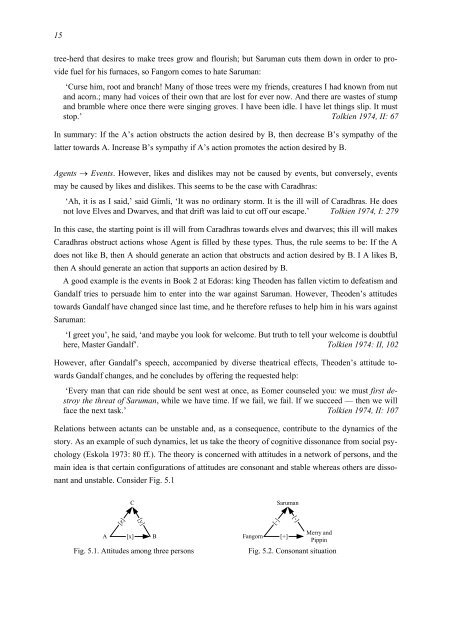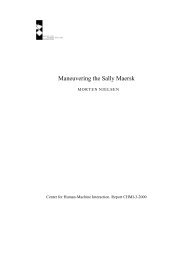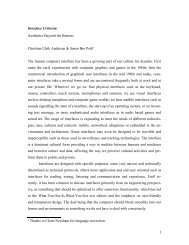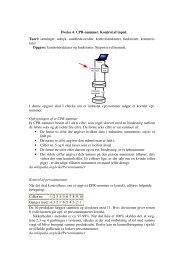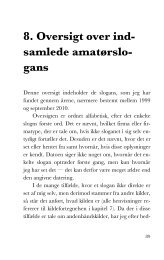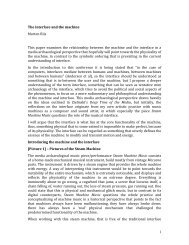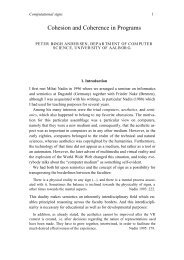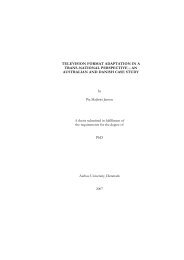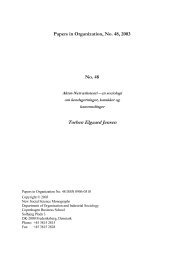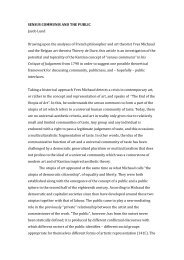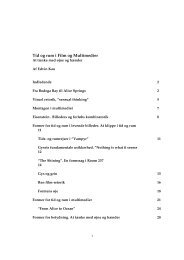Interaction and narration. Tearing Tolkien apart - CiteSeerX
Interaction and narration. Tearing Tolkien apart - CiteSeerX
Interaction and narration. Tearing Tolkien apart - CiteSeerX
Create successful ePaper yourself
Turn your PDF publications into a flip-book with our unique Google optimized e-Paper software.
[z]<br />
[y]<br />
[-]<br />
[-]<br />
15<br />
tree-herd that desires to make trees grow <strong>and</strong> flourish; but Saruman cuts them down in order to provide<br />
fuel for his furnaces, so Fangorn comes to hate Saruman:<br />
‘Curse him, root <strong>and</strong> branch! Many of those trees were my friends, creatures I had known from nut<br />
<strong>and</strong> acorn.; many had voices of their own that are lost for ever now. And there are wastes of stump<br />
<strong>and</strong> bramble where once there were singing groves. I have been idle. I have let things slip. It must<br />
stop.’ <strong>Tolkien</strong> 1974, II: 67<br />
In summary: If the A’s action obstructs the action desired by B, then decrease B’s sympathy of the<br />
latter towards A. Increase B’s sympathy if A’s action promotes the action desired by B.<br />
Agents → Events. However, likes <strong>and</strong> dislikes may not be caused by events, but conversely, events<br />
may be caused by likes <strong>and</strong> dislikes. This seems to be the case with Caradhras:<br />
‘Ah, it is as I said,’ said Gimli, ‘It was no ordinary storm. It is the ill will of Caradhras. He does<br />
not love Elves <strong>and</strong> Dwarves, <strong>and</strong> that drift was laid to cut off our escape.’ <strong>Tolkien</strong> 1974, I: 279<br />
In this case, the starting point is ill will from Caradhras towards elves <strong>and</strong> dwarves; this ill will makes<br />
Caradhras obstruct actions whose Agent is filled by these types. Thus, the rule seems to be: If the A<br />
does not like B, then A should generate an action that obstructs <strong>and</strong> action desired by B. I A likes B,<br />
then A should generate an action that supports an action desired by B.<br />
A good example is the events in Book 2 at Edoras: king Theoden has fallen victim to defeatism <strong>and</strong><br />
G<strong>and</strong>alf tries to persuade him to enter into the war against Saruman. However, Theoden’s attitudes<br />
towards G<strong>and</strong>alf have changed since last time, <strong>and</strong> he therefore refuses to help him in his wars against<br />
Saruman:<br />
‘I greet you’, he said, ‘<strong>and</strong> maybe you look for welcome. But truth to tell your welcome is doubtful<br />
here, Master G<strong>and</strong>alf’. <strong>Tolkien</strong> 1974: II, 102<br />
However, after G<strong>and</strong>alf’s speech, accompanied by diverse theatrical effects, Theoden’s attitude towards<br />
G<strong>and</strong>alf changes, <strong>and</strong> he concludes by offering the requested help:<br />
‘Every man that can ride should be sent west at once, as Eomer counseled you: we must first destroy<br />
the threat of Saruman, while we have time. If we fail, we fail. If we succeed — then we will<br />
face the next task.’ <strong>Tolkien</strong> 1974, II: 107<br />
Relations between actants can be unstable <strong>and</strong>, as a consequence, contribute to the dynamics of the<br />
story. As an example of such dynamics, let us take the theory of cognitive dissonance from social psychology<br />
(Eskola 1973: 80 ff.). The theory is concerned with attitudes in a network of persons, <strong>and</strong> the<br />
main idea is that certain configurations of attitudes are consonant <strong>and</strong> stable whereas others are dissonant<br />
<strong>and</strong> unstable. Consider Fig. 5.1<br />
C<br />
Saruman<br />
A [x] B<br />
Fig. 5.1. Attitudes among three persons<br />
Fangorn<br />
[+]<br />
Merry <strong>and</strong><br />
Pippin<br />
Fig. 5.2. Consonant situation


